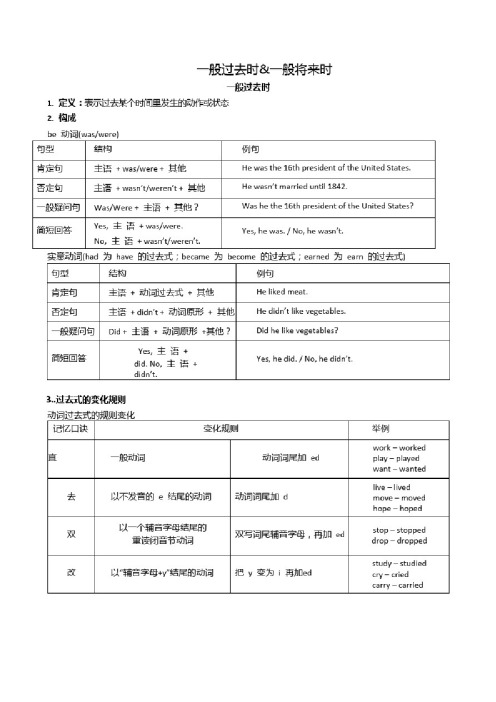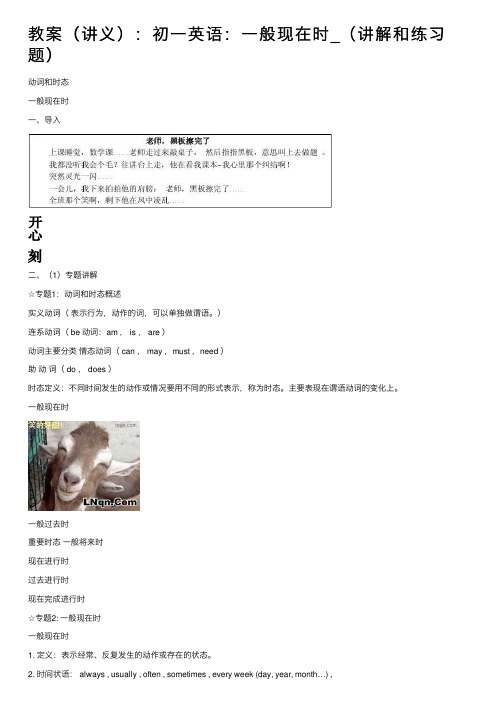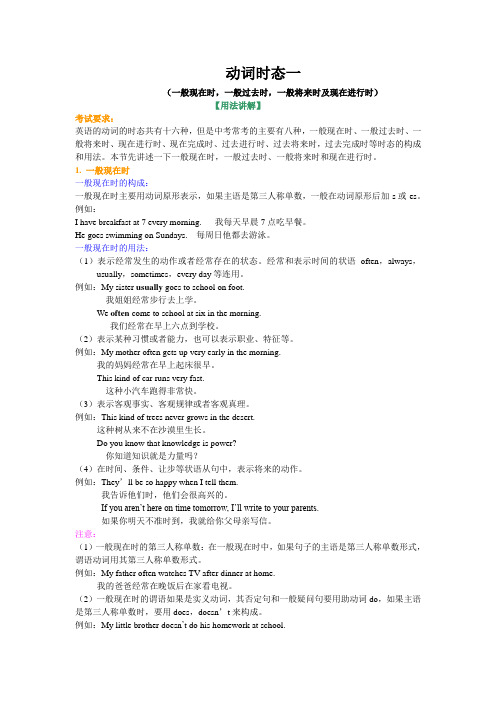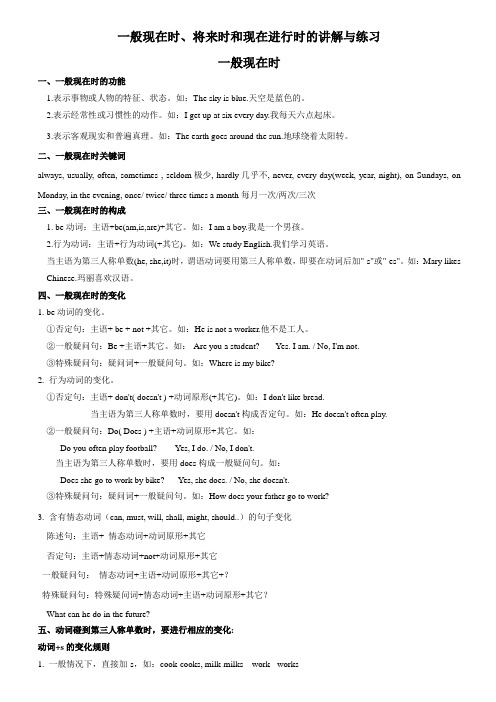一般现在时、一般过去时、一般将来时 讲义和练习
一般过去时一般将来时讲解和练习题附答案

—般过去时&—般将来时一般过去时1.定义:表示过去某个时间里发生的动作^状态2-构成be动词(was/were)句型结构例句肯定句主语+was/were+其他He was the16th president of the United States.否定句主语+wasn f t/weren f t+ 其他He wasn't married until1842.—般疑问句Was/Were+主语+其他?Was he the16th president of the United States?简短回答Yes,主语+was/were.No,主语4- wasn't/werenYYes,he was./No,he wasn't.实意动词(had为have的过去式;became为become的过去式;earned为earn的过去式)句型结构肯定句主语+动词过去式+其他He liked meat.否定句主语+didn't+动词原形+其他He didn't like vegetables.—般疑问句Did+主语+动词原形+其他?Did he like vegetables?简短回答Yes,主语+did.No,主语 +didn't.Yes,he did./No,he didn't.3..过去式的变化规则动词过去式的规则变化记忆口诀变化规则举例直动词词尾加ed work一worked play一played want一wanted去以不发音的e结尾的动词动词词尾加d live一lived move—moved hope一hoped双以一个辅音字母结尾的重读闭音节动词双写词尾辅音字母,再加ed stop-stoppeddrop—dropped改以"辅音字母+y”结尾的动词把Y变为i再加ed study-studied cry—cried carry—carried动词过去式的不规则变化原形过去式原形过去式原形过去式原形过去式do did go went cost cost cut cut hurt hurt put put read read shut shut come came become became keep kept sleep slept build built lend lent send sent spend spent sit sat give gave drive drove buy bought bring brought think thought fight fought teach taught catch caught know knew grow grew throw threw draw drew get got hold held meet met3.时间标志词yesterday 系列yesterdayyesterday morning/afternoonthe day before yesterdayThe twins went to Happy Valley the day before yesterday.Tony gave me an English-Chinese dictionary yesterday morning.last 系列last night/weekthe day/week before lastTom swam across the Atlantic Ocean last year.Angela rode her bicycle from China to America the year before last.ago 系列three days ago,two weeks agofive months ago,one year ago1saw a snake in the kitchen four weeks ago.1became a firefighter two years ago.其他时间just now(刚刚)in+过去某月/年Where did you go just now?1won a swimming competition in2000.TS将来时L定义:表示捋来某个时间发生的动作^状态2.构成&用法A. be qoinq to+动词原形(be=am, is, are)句型结构例句肯定句主语+be going to+其他1am going to have a picnic tomorrow.She is going to have a picnic tomorrow. They are going to have a picnic tomorrow.否定句主语+be not going to+动词原形+其他1am not going to have a picnic tomorrow. She isn't going to have a picnic tomorrow. They aren't going to have a picnic tomorrow—殷疑问句Be+主语+going to+动词原形+其他?Are you going to have a picnic tomorrow? Is she going to have a picnic tomorrow? Are they going to have a picnic tomorrow?简短回答Yes,主语+be.No,主+benot.Yes,1am./No,I'm not.Yes,she is./No,she isn't.No f they are./No,they aren't.B.will+ 动词原形(will not=won,t)句型例句肯定句主语+will+其他He will get better.否定句主语+won't+动词原形+其他1won't tell anybody about your secrets.—般疑问句Will+主语+动词原形+其他?Will you go to the cinema with me?简短回答Yes,主语+will.No,主语+won't.Yes,1will./N。
一般现在、将来、过去时态

C. They have gone to the park already. (现在 完成时)
D. He is going to the park this Sunday. (一 般将来时)
填空题
填空题1: 请在下列句子的空白处填入 正确的动词时态。
I ____(not know) the answer to the question.
05
CATALOGUE
练习题
选择题
选择题1: 下列句子中,哪个动词的 时态是正确的?
B. I wrote a letter yesterday. (过去 时)
A. I am writing a letter. (现在进行时 )
选择题
C. I will write a letter tomorrow. (将来时)
例子对比
一般现在时态例子
一般过去时态例子
I eat an apple every day. (我每天吃 一个苹果。)
I ate an apple yesterday. (我昨天吃 了一个苹果。)
一般将来时态例子
I will visit my grandparents next week. (我下周会去看望我的祖父母。 )
用法
1 2
描述习惯、常态行为或目前事实
I usually get up at 7 o’clock every morning. (我通常每天早上7点起床。)
表达真理或普遍事实
The sun rises in the east.(太阳从东方升起。 )
3
描述现在的状态
He is a student.(他是一名学生。)
They ____(not finish) their homework yet.
教案(讲义):初一英语:一般现在时_(讲解和练习题)

教案(讲义):初⼀英语:⼀般现在时_(讲解和练习题)动词和时态⼀般现在时⼀、导⼊⼆、(1)专题讲解☆专题1:动词和时态概述实义动词(表⽰⾏为,动作的词,可以单独做谓语。
)连系动词( be 动词:am , is , are )动词主要分类情态动词( can , may ,must ,need )助动词( do , does )时态定义:不同时间发⽣的动作或情况要⽤不同的形式表⽰,称为时态。
主要表现在谓语动词的变化上。
⼀般现在时⼀般过去时重要时态⼀般将来时现在进⾏时过去进⾏时现在完成进⾏时☆专题2: ⼀般现在时⼀般现在时1. 定义:表⽰经常、反复发⽣的动作或存在的状态。
2. 时间状语: always , usually , often , sometimes , every week (day, year, month…) ,on Sundays 等3. ⼀般现在时的结构及句型变化结构:⼀般现在时的结构主要有三种形式:1.结构⼀(谓语动词为be动词时)肯定句:主语+be(am ,is ,are)+其它.否定句:主语+be+not+其它.⼀般疑问句:Be+主语+其它?e.g. He is a worker. e.g. They are in the classroom.He is not a worker. They aren’t in the classroom.Is he a worker? Are they in the classroom?Yes, he is. / No, he is not. Yes, they are. / No, they aren’t. 课堂练习:1.I am very happy today.(变否定句)_______________________________________________2.Tom is in the classroom.(变⼀般疑问句,并作否定回答)_______________________________________________ 2. 结构⼆(谓语动词为情态动词时)(注意:情态动词can ,may ,must ,need 等等。
一般现在时,一般过去时,一般将来时及现在进行时

动词时态一(一般现在时,一般过去时,一般将来时及现在进行时)【用法讲解】考试要求:英语的动词的时态共有十六种,但是中考常考的主要有八种,一般现在时、一般过去时、一般将来时、现在进行时、现在完成时、过去进行时、过去将来时,过去完成时等时态的构成和用法。
本节先讲述一下一般现在时,一般过去时、一般将来时和现在进行时。
1. 一般现在时一般现在时的构成:一般现在时主要用动词原形表示,如果主语是第三人称单数,一般在动词原形后加-s或-es。
例如:I have breakfast at 7 every morning. 我每天早晨7点吃早餐。
He goes swimming on Sundays. 每周日他都去游泳。
一般现在时的用法:(1)表示经常发生的动作或者经常存在的状态。
经常和表示时间的状语often,always,usually,sometimes,every day等连用。
例如:My sister usually goes to school on foot.我姐姐经常步行去上学。
We often come to school at six in the morning.我们经常在早上六点到学校。
(2)表示某种习惯或者能力,也可以表示职业、特征等。
例如:My mother often gets up very early in the morning.我的妈妈经常在早上起床很早。
This kind of car runs very fast.这种小汽车跑得非常快。
(3)表示客观事实、客观规律或者客观真理。
例如:This kind of trees never grows in the desert.这种树从来不在沙漠里生长。
Do you know that knowledge is power?你知道知识就是力量吗?(4)在时间、条件、让步等状语从句中,表示将来的动作。
例如:They’ll be so happy when I tell them.我告诉他们时,他们会很高兴的。
一般现在时-将来时和现在进行时的讲解与练习

一般现在时、将来时和现在进行时的讲解与练习一般现在时一、一般现在时的功能1.表示事物或人物的特征、状态。
如:The sky is blue.天空是蓝色的。
2.表示经常性或习惯性的动作。
如:I get up at six every day.我每天六点起床。
3.表示客观现实和普遍真理。
如:The earth goes around the sun.地球绕着太阳转。
二、一般现在时关键词always, usually, often, sometimes , seldom极少, hardly几乎不, never, every day(week, year, night), on Sundays, on Monday, in the evening, once/ twice/ three times a month每月一次/两次/三次三、一般现在时的构成1. be动词:主语+be(am,is,are)+其它。
如:I am a boy.我是一个男孩。
2.行为动词:主语+行为动词(+其它)。
如:We study English.我们学习英语。
当主语为第三人称单数(he, she,it)时,谓语动词要用第三人称单数,即要在动词后加"-s"或"-es"。
如:Mary likes Chinese.玛丽喜欢汉语。
四、一般现在时的变化1. be动词的变化。
①否定句:主语+ be + not +其它。
如:He is not a worker.他不是工人。
②一般疑问句:Be +主语+其它。
如:-Are you a student? -Yes. I am. / No, I'm not.③特殊疑问句:疑问词+一般疑问句。
如:Where is my bike?2. 行为动词的变化。
①否定句:主语+ don't( doesn't ) +动词原形(+其它)。
如:I don't like bread.当主语为第三人称单数时,要用doesn't构成否定句。
一般现在时、过去时、将来时精讲资料.

By Zhao Yang
Tense : the form of a verb which shows whether you are refering to the past, present, or future.
What Tense do these sentences belong to?
"tomorrow", "the day after tomorrow", "next Sunday", "soon", "in a few days"
➢will/shall + V(original form)
↓
I, We
I shall study harder in English.
I will........
Mary get up at six o'clock every day.
√ gets
×
2.Simple Past Tense
(一般过去时)
➢something that happened in the past
"yesterday", "last year", "last night", "some years ago"
1.Simple Present Tense
(一般现在时)
➢the present condition John is sick.
➢something that happens quite often I go to school by bike every day. "every day", "often","always" , "usually","sometimes"
一般现在时,一般过去时,一般将来时及现在进行时资料
一般现在时,一般过去时,一般将来时及现在进行时动词时态一(一般现在时,一般过去时,一般将来时及现在进行时)【用法讲解】考试要求:英语的动词的时态共有十六种,但是中考常考的主要有八种,一般现在时、一般过去时、一般将来时、现在进行时、现在完成时、过去进行时、过去将来时,过去完成时等时态的构成和用法。
本节先讲述一下一般现在时,一般过去时、一般将来时和现在进行时。
1. 一般现在时一般现在时的构成:一般现在时主要用动词原形表示,如果主语是第三人称单数,一般在动词原形后加-s或-es。
例如:I have breakfast at 7 every morning. 我每天早晨7点吃早餐。
He goes swimming on Sundays. 每周日他都去游泳。
一般现在时的用法:(1)表示经常发生的动作或者经常存在的状态。
经常和表示时间的状语often,always,usually,sometimes,every day等连用。
例如:My sister usually goes to school on foot.我姐姐经常步行去上学。
We often come to school at six in the morning.我们经常在早上六点到学校。
(2)表示某种习惯或者能力,也可以表示职业、特征等。
例如:My mother often gets up very early in the morning.我的妈妈经常在早上起床很早。
This kind of car runs very fast.这种小汽车跑得非常快。
(3)表示客观事实、客观规律或者客观真理。
例如:This kind of trees never grows in the desert.这种树从来不在沙漠里生长。
Do you know that knowledge is power?你知道知识就是力量吗?(4)在时间、条件、让步等状语从句中,表示将来的动作。
1、学生讲解习题(一般现在时一般过去时、一般将来时部分)
.概念:①;②;③。
(1)be型:句子的谓语动词只有be(am,is或are):a.肯定句中,只出现be,如:I am a student.我是一名学生。
b.否定句中,c.一般疑问句,(2)实义动词型:a.肯定句中,只出现实义动词,如:I get up in the morning.b.否定句中,every…, sometimes, at…, on Sunday2) 客观真理,客观存在,科学事实。
Shanghai lies in the east of China.3) 表示格言或警句中。
Pride goes before a fall. 骄者必败。
4) 现在时刻的状态、能力、性格、个性。
I don't want so much.现在一般时动词变化的规则是:1.如果主语是名词复数和第一人称I、we ,谓语动词不用做任何变化,2.主语是任何一个单数名词或者是第三人称单数,谓语动词要进行必要的变化。
特别提一点:不可数名词也算作单数处理。
3.谓语动词的变化规律是:(1) 在动词后加-s,-es read - reads,write - writes,say - says(2) 以s,x,ch,sh 结尾的词加-es teach - teaches,wash - washes,(3) 以辅音字母+y结尾的词变y为i再加-es try - tries,carry – carries(4) 特殊变化的词be (是) - am, is, are (I am she/he/it,名词单数都用is ,we, you, they, 名词复数都用are have (有) - have, has I, we, you, they, 名词复数都用have she/he/it is, 名词单数都用has)(5) 助动词,不论单复数、不论什么人称都没有变化,can, may, must, need, ought to 等。
中考英语时态复习教案(3篇)
第1篇教学目标1. 理解并掌握中考英语中常见的五种基本时态:一般现在时、一般过去时、一般将来时、现在进行时和现在完成时。
2. 熟练运用这五种时态进行日常对话和书面表达。
3. 能够区分和运用特殊用法,如现在完成时中already, just, yet等词的区别。
教学重点1. 五种基本时态的构成和用法。
2. 特殊用法的理解和运用。
教学难点1. 一般过去时和现在完成时的区别。
2. 现在完成时中already, just, yet等词的区别使用。
教学方法- 讲授法- 练习法- 合作学习法教学准备- 多媒体教学设备- 教学PPT- 练习题教学过程第一课时:一般现在时和一般过去时Step 1: 导入- 通过提问学生日常生活中常用的英语表达,引出时态的概念。
Step 2: 讲解- 讲解一般现在时的构成和用法,包括表示经常性和习惯性的动作、客观真理、科学事实等。
- 讲解一般过去时的构成和用法,包括表示过去发生的动作或存在的状态、过去经常性或习惯性的动作等。
Step 3: 练习- 学生进行口头练习,如用一般现在时描述日常活动,用一般过去时描述过去发生的事情。
- 练习完成句子,如:“I ______ (go) to school by bus every day.”Step 4: 小组活动- 学生分组,进行角色扮演,用一般现在时和一般过去时进行对话。
第二课时:一般将来时和现在进行时Step 1: 复习- 复习上一课时的内容,检查学生对一般现在时和一般过去时的掌握情况。
Step 2: 讲解- 讲解一般将来时的构成和用法,包括will, be going to等结构。
- 讲解现在进行时的构成和用法,包括be动词+现在分词结构。
Step 3: 练习- 学生进行口头练习,如用一般将来时描述未来的计划,用现在进行时描述正在进行的动作。
- 练习完成句子,如:“I ______ (go) to the movies this evening.”Step 4: 小组活动- 学生分组,进行角色扮演,用一般将来时和现在进行时进行对话。
最新仁爱-初中英语时态讲解及练习教学讲义PPT
谓语动词使用过去式形式, 加ed,分为规则和不规则变 化。表示过去经常发生的动 作,也可用“used to do ” 和“would +动词原形”。
1. He____(be, was, were, been) here a moment ago. 2. They ____(be, was, were, been) here just now. 3. The scientists _____(leave, leaves, leaved, left) for America yesterday. 4. Last week we ______(visit, visited ) the Science Museum. 5. When I was a child, I often ____(play, played) football. 6. The students ran out of the classroom as soon as the bell ____(ring, rang, rung).
现在进行时
作谓语的动词用来表示动作(情况)发 生时间的各种形式称为时态。
1.概念:表示现阶段或说话时正在进行 的动作及行为。 2.时间状语:Now, at this time, days, look. listen等时间状语做标志。 3.基本结构:主语+be +doing +其他 4.否定形式:主语+be +not +doing+其他 5.一般疑问句:把be动词放于句首。
一般过去时
概念:过去某个时间里发生的动作或状态; 过去习惯性、经常性的动作、行为。 时间状语:ago, yesterday, the day before yesterday, last week(year, night, month…), in 1989, just now, at the age of 5, one day, long long ago, once upon a time, etc. 基本结构:①be动词;②行为动词 否定形式:①was/were+not;②在行为动词 前加didn't,同时还原行为动词。 一般疑问句:①was或were放于句首;②用 助动词do的过去式did 提问,同时还原行为 动词。
- 1、下载文档前请自行甄别文档内容的完整性,平台不提供额外的编辑、内容补充、找答案等附加服务。
- 2、"仅部分预览"的文档,不可在线预览部分如存在完整性等问题,可反馈申请退款(可完整预览的文档不适用该条件!)。
- 3、如文档侵犯您的权益,请联系客服反馈,我们会尽快为您处理(人工客服工作时间:9:00-18:30)。
一般现在时、一般过去时、一般将来时讲义和练习一、一般现在时1.概念:经常、反复发生的动作或行为,现在的某种状况,表示普遍真理或客观事实2.时间状语: Always, usually, often, sometimes, every week (day, year, month…), once a week(day, year, month…), on Sundays,3.基本结构:主语 + 动词原形+其他(如主语为第三人称单数,动词上要改为第三人称单数形式)4.否定形式:主语+am/is/are +not+其他; 此时态的谓语动词若为行为动词,则在其前加don't, 如主语为第三人称单数,则用doesn't,同时还原行为动词。
5.一般疑问句:把be动词放于句首;用助动词do提问,如主语为第三人称单数,则用does,同时,还原行为动词。
二、一般过去时1.概念:过去某个时间里发生的动作或状态;过去习惯性、经常性的动作、行为。
2.时间状语:ago, yesterday, the day before yesterday, last week,last(year, night, month…), in 1989, just now, at the age of 5, one day, long long ago, once upon a time, etc.3.基本结构:主语+be动词过去式;主语+行为动词的过去式4.否定形式:主语+was/were +not+其他;在行为动词前加didn't,同时还原行为动词。
5.一般疑问句:was或were放于句首;用助动词do的过去式did 提问,同时还原行为动词。
6.例句:She often came to help us in those days.I didn't know you were so busy.三、现在进行时1.概念:表示现阶段或说话时正在进行的动作及行为。
2.时间状语:Now, at this time, days, etc. look. listen3.基本结构:主语+be +doing +其他4.否定形式:主语+be +not +doing+其他5.一般疑问句:把be动词放于句首。
6.例句: How are you feeling today?He is doing well in his lessons.四、一般将来时1.概念:表示将要发生的动作或存在的状态及打算、计划或准备做某事。
2.时间状语:Tomorrow, next day(week, month, year…),soon, in a few minutes, by…,the day after tomorrow, etc.3.基本结构:主语+am/is/are +going to + do+其他;主语+will/shall + do+其他4.否定形式:主语+am/is/are not going to do ;主语+will/shall not do+其他5.一般疑问句:be放于句首;will/shall提到句首。
(第一人称I/we 用shall)6.例句:They are going to have a competition with us in studies.It is going to rain.四种基本时态练习一、写出下列动词的第三人称单数:drink ________ go ________ stay ________ make ________look _________ have_______ pass_______ carry ________ come________ watch______ plant_______ fly _________study_______ brush________ do_________ teach________二、写出下列动词的现在分词:sit ____________run____________swim___________make______________go_____________ like____________ write_____________read_____________have____________ sing ____________ dance__________put_____________see____________ buy _____________ love____________live___________take_____________come_____________get____________begin____________三、写出下列动词的过去式is\am_____________ fly____________ plant____________ are____________drink_____________ play___________ go______________ make ___________does_____________ dance__________ worry___________ ask___________taste_____________ eat____________ draw____________ put____________throw____________ kick___________ pass____________ do _____ _____四、用括号内动词的适当形式填空。
1. He often ________(have) dinner at home.2. David and Tom _______(be) in Class One.3. Mike _______(not go) to the zoo on Sundays.4. What _______they often _______(do) on Saturdays?5. Mike _______(like) cooking.6. You always _______(do) your homework well.7. I _______(be) ill. I'm staying in bed.8. The child often _______(watch) TV in the evening.9.The boy __________________ ( draw)a picture now.10. Listen .Some girls _______________ ( sing)in the classroom .11. What _____ you ______ ( do ) now?12. Look . They _______________( have) an English lesson .13.They ____________(not ,water) the flowers now.14.What is our granddaughter doing? She _________(listen ) to music.15. It's 5 o'clock now. We _____________(have)supper now16.______Helen____________(wash )clothes? Yes ,she is17. Today is a sunny day. We _____________ (have) a picnic this afternoon.18. My brother ________________ (go) to Shanghai next week.19. Tom often _________(go) to school on foot. But today is rain. He _________________ (go) to school by bike.20. What do you usually do at weekends? I usually __________ (watch) TV and ____________(catch) insects?21. It's Friday today. What _____she ____________________ (do) this weekend? She __________________ (watch) TV and (catch) insects. 22. What ______ (do) you do last Sunday? I ______ (pick) apples on a farm.What ___________ (do) next Sunday? I ____________________ (milk) cows.23. Mary ________________________ (visit) her grandparents tomorrow.24. Liu Tao ____________________ (fly) kites in the playground yesterday.25. David ______________________ (give) a puppet show next Monday.26. I ________________________ (plan) for my study now.27. I ______ (watch) a cartoon on Saturday.58. Her father _______ (read) a newspaper last night.29. We _________ to zoo yesterday, we _____ to the park. (go)30. ______ you _______ (visit) your relatives last Spring Festival?31. What ______ she _______ (find) in the garden last morning?She __________ (find) a beautiful butterfly.32. It ______ (be) Ben's birthday last Friday.33. We all ______ (have) a good time last night.34. She likes ______ newspapers, but she ______ a book yesterday. (read)35. He _______ football now, but they _______ basketball just now. (play)四、按照要求改写句子1. David watches TV every evening.(改为否定句)___________________________________________________________ _________2. I do my homework every day.(改为一般疑问句,作否定回答)___________________________________________________________ _________3. She likes milk.(改为一般疑问句,作肯定回答)___________________________________________________________ _________4. Tom and David like going skating.(改为否定句)___________________________________________________________ _________5. He speaks English very well.(改为否定句)____________________________________6. I like taking photos in the park.(对划线部分提问)___________________________________________________________ _________7. Jim comes from Canada.(对划线部分提问)___________________________________________________________ _________8. She is always a good student.(改为一般疑问句,作否定回答)___________________________________________________________ _________9. They are doing housework .(分别改成一般疑问句和否定句)___________________________________________________________ _____________________________________________________________ __10.I’m playing the football in the playground.(对划线部分进行提问)___________________________________________________________ ______11.Tom is reading books in his study. (对划线部分进行提问)___________________________________________________________ ______12. Nancy is going to go swimming.(改否定)Nancy ________ going to go camping.13. I’ll go and join them.(改否定)I _______ go ______ join them.14. I'm going to get up at 6:30 tomorrow.(改一般疑问句。
